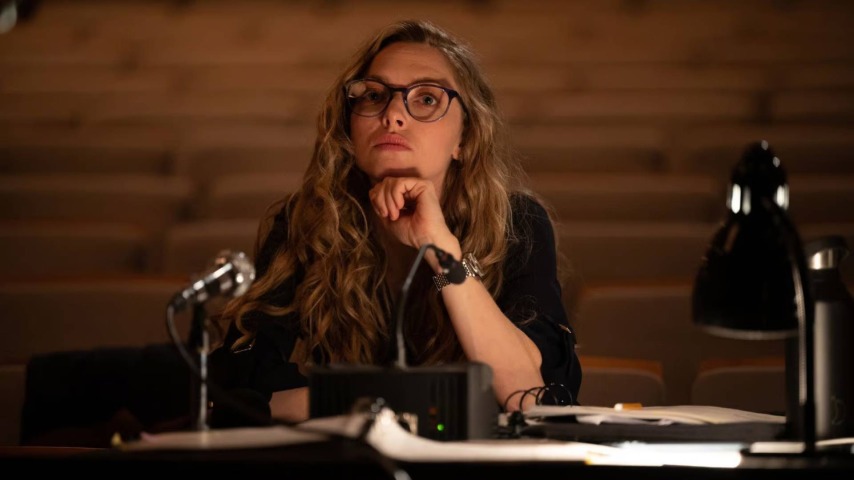A deft Amanda Seyfried struggles to find nuance in Seven Veils' theatrical metaphor
Atom Egoyan's latest erases all subtext from its tale of a woman reclaiming herself through art.
Photo: Elevation Pictures
Atom Egoyan’s Seven Veils opens with an oft-repeated line conveyed through voiceover: “I’ve been asked to make this personal, so I am.” The speaker is Jeanine (Amanda Seyfried), a young regional theater director who’s been given the ambitious task of remounting a famed interpretation of Richard Strauss’ Salome. But it becomes readily apparent that Jeanine doesn’t have to make Salome personal; it already comes that way for her. Jeanine monologues in fits and spurts, but eventually it is revealed that these musings are not just for the movie’s viewers; they are recordings spoken to a man named Charles. Charles is dead—he is the stage director whose final wish was to see his production posthumously mounted by his former protégé…and mistress. Their affair was an open secret among those in the theater community, with rumors that swirled around the two of them as well as the association between Jeanine’s father and Charles. From beyond the grave, Jeanine is still at the whims of the two men who shaped her adolescent life, and Seven Veils attempts to paint a portrait of a woman reclaiming herself through the art that once exploited her.
Egoyan’s film is at once stylish and slipshod, a film that is both gorgeously shot—haunting shadows, deep colors—and inelegant in its themes of sexual trauma and assault. Seven Veils is a real work of “I know writers who use subtext, and they’re all cowards.” The title refers to the Dance Of The Seven Veils performed by Salome at the birthday celebration of her step-father, King Herod Antipas, in exchange for Herod’s willingness to execute John the Baptist and present his head on a platter. It is never subtextual that Jeanine is meant to align with Salome and Herod her deceased father—a man who had an incestuous fixation on Jeanine from childhood and forced her to perform in bizarre, avant-garde home videos in which she’s led blindfolded through the woods. These videos (which are so weakly constructed and acted they can’t help being amusing) then made their way into Charles’ production, an aesthetically modern interpretation of the biblical story that utilizes minimalistic, off-kilter production design. It is mentioned more than once how Charles and Jeanine’s father had a peculiar relationship, though to what extent it remains unclear. But the two men were clearly drawn to one another through their fascination with Salome and their “love” for Jeanine.
It isn’t long before Jeanine finds her plate overloaded, between her internal demons and her external disputes. She struggles to unpack the baggage inherent to her involvement in this remount, while dodging criticisms from management and from Charles’ still-living wife, Beatrice (Lanette Ware), who weathered Charles’ affair. Jeanine’s lead actor, Johann (Michael Kupfer-Radecky), is a big, brutish man who doesn’t respect her direction; her husband Paul (Mark O’Brien) is pursuing her mother’s nurse during their separation; and worst of all, she’s being needled by a podcaster. For the moment, Jeanine is the world’s most persecuted woman, and she is surrounded by an enclave of men—or those working for the behest of men—who are doing all they can to stymie and silence her. Jeanine was asked to make things personal, but only within certain limits. Nobody actually wants too much of Jeanine in Charles’ production.
As Jeanine, Seyfried (who collaborated with Egoyan once prior, in 2009’s Chloe) gives a phenomenal show. The command in her voice betrays a girlish timbre, which acts as dexterous characterization for Jeanine. Seyfried’s big eyes burst with sincerity, seen in the impassioned soliloquies she imparts upon her actors in order to achieve their desired performance. But Egoyan and cinematographer Paul Sarossy nimbly lay forth the reservations felt in Jeanine’s subjects, in side eyes, smirks, and subtle exchanges caught by their camera. Suddenly, the confidence she exudes gives way to noticeable insecurities, and her big ideas instead feel scatterbrained, indecisive. Even Jeanine admits doubt in her ability to manage this undertaking. She’s resentful of this task that’s been thrust upon her by a man who no longer even walks this earth.
